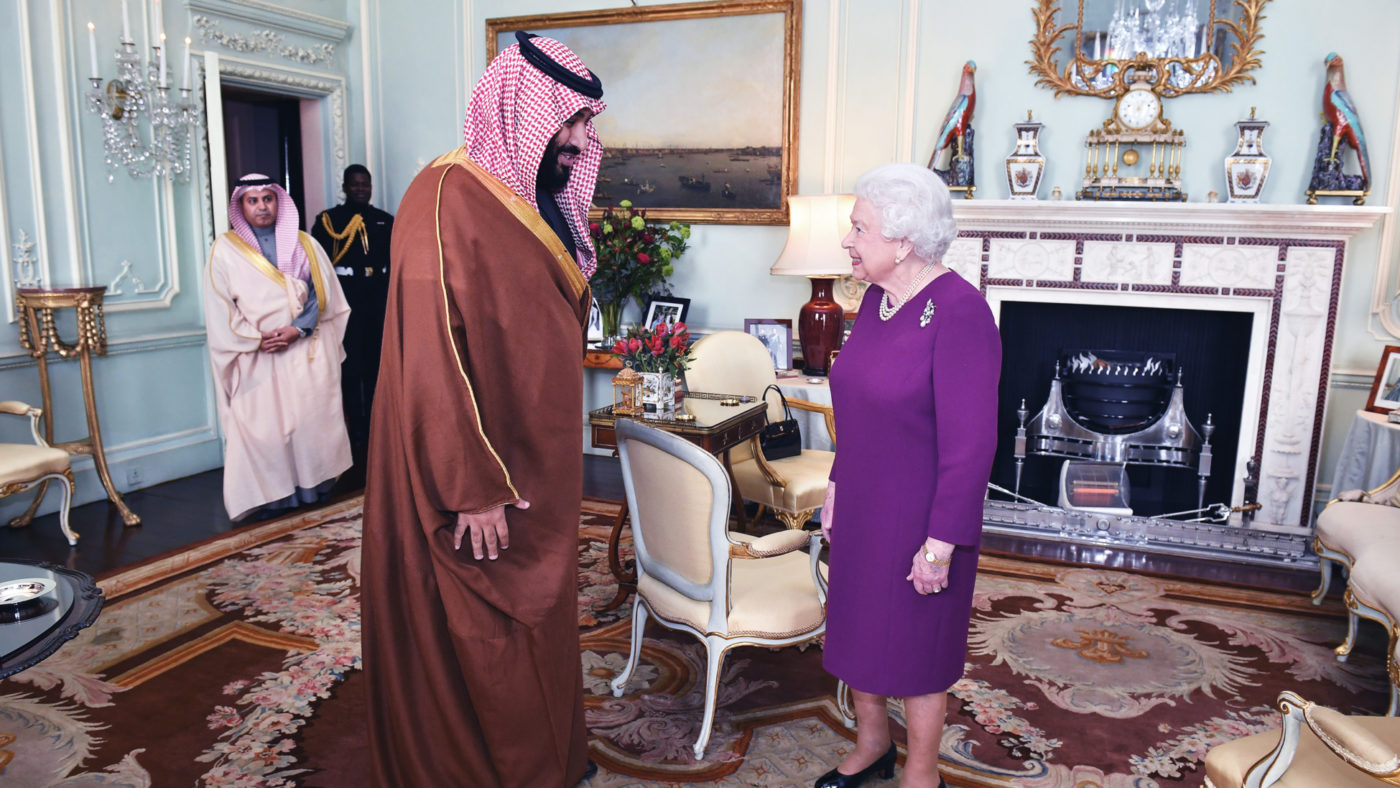Today, the Saudi crown prince, Mohammed bin Salman, has arrived in Britain, beginning a three-day visit. This British sojourn is part of a global tour which has taken bin Salman to Egypt and which will include a visit to the United States.
Bin Salman’s visit has been made dull by bureaucracy and protocol. Smiling, bin Salman has posed for pictures with the Queen. Such things are not normally exciting. But the visit is consequential nonetheless. It matters because it is another demonstration of the power and growing international status of the ambitious young prince, a man whose supporters consider him a harbinger of great positive change.
The promise of reform excites some, in Saudi Arabia and around the world. The possibility of protest excites others, especially in Britain. Bin Salman’s arrival in this country has been met with muted but real protest. Opportunistic opposition politicians, notably Emily Thornberry, have expressed their dismay at what bin Salman’s visit says about the shamelessness of the government.
That dismay may well be ironic posturing, but it is not entirely unwarranted. The government is certainly doing its best both to welcome and woo bin Salman. Boris Johnson, the foreign secretary, put his name to a piece in The Times which, in typically florid style, invokes Winston Churchill drinking the pure water of Mecca in the presence of King Abdulaziz Ibn Saud.
Johnson’s article argues not just in favour of continued involvement with the Saudi state; it is notably pro-Mohammed bin Salman. “I believe that the Crown Prince, who is only 32, has demonstrated by word and deed that he aims to guide Saudi Arabia in a more open direction,” the foreign secretary writes.
British politicians and officials have greeted the bin Salman’s trip with real, if diplomatically overblown, optimism. The foreign office claims the visit begins “a new chapter” in diplomatic relations between the two kingdoms. Some of this optimism is justified. Bin Salman envisions a newly dynamic Saudi economy, no longer dependent on oil. The foreign office press release and Johnson’s piece notably reference Vision 2030, the Saudi plan to make its economy more dynamic, more open, and underwritten by global investment and trade.
A revitalised Saudi state is a dream scenario for both Britain and bin Salman; it would present an object candidate for the sort of bilateral trade deals British officials must negotiate after the UK leaves the European Union. Britain wants desperately to involve itself in Vision 2030.
This requires politicians and officials to acknowledge and exaggerate bin Salman’s best characteristics. British leaders, in the continuing search for willing trade partners after Brexit, are compelled to hope for the best for the Saudi reforms with which he is associated, and to play the part with sincerity. Hence Johnson’s comment that: “In the 8 months since Mohammed bin Salman became Crown Prince, Saudi Arabia has introduced exactly the kind of reforms that we have always advocated.” Note the retroactive association of British wishes with what have been, largely, reforms carried out by the arbitrary exercise of internal power.
As ever in diplomacy, the stated optimism of British politicians and officials is not entirely in line with reality. Bin Salman has certainly presided over some domestic reforms – and they are not insubstantial. Under the auspices of his reforming gaze, the Saudi ban on women driving has been lifted. Cinemas have reopened. Public concerts have been staged, though dancing is not exactly encouraged.
But reform is hardly bin Salman’s sole occupation. In his short time in office, bin Salman has led a crackdown on political opponents, jailing some and shaking others down to the financial benefit of the state. None of these things breed confidence. Investors develop jitters. So too do potential partners in commerce or diplomacy.
Bin Salman is also, despite his apparent power and ascendant image, vulnerable. His position is also not assured. Though his purge was largely intended to secure bin Salman’s domestic power, it has not deferred criticism or even the possibility of political challenge inevitably. Britain’s leaders must be careful. Bin Salman could be the coming man, on the verge of reforming his country’s economy and society – a future trading partner and ally par excellence. Or he may be on the brink of overstretch, failure and ignominy.
Rolling out the red carpet for the young prince could appear, retrospectively, an act of immense hubris not too far in the future.
British politicians are right to treat bin Salman’s visit with some optimism, as it is right to see his advent in cautiously positive terms. But there is little reason to hope for anything concrete in exchange for this exercise in British hospitality.


